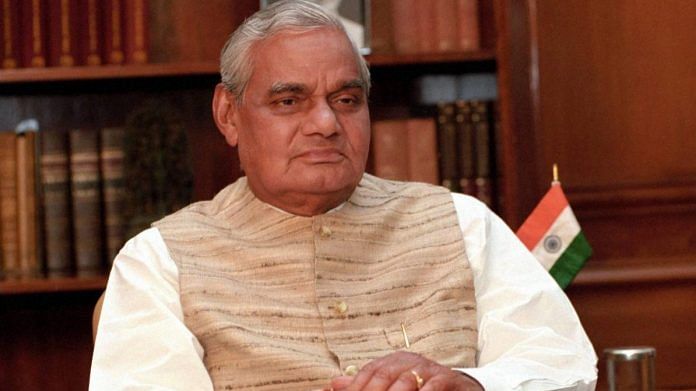
Thank you dear subscribers, we are overwhelmed with your response.
Your Turn is a unique section from ThePrint featuring points of view from its subscribers. If you are a subscriber, have a point of view, please send it to us. If not, do subscribe here: https://theprint.in/
On late PM Atal Bihari Vajpayee’s 97th birth anniversary (December 25), the
vacuum his absence creates in Indian politics and nation as a whole is
monumental. But it is in the strange tales of ex-PM that even in the list of active
politicians today in power/opposition, we are unable to illustrate a picture of that
one politician who is a strong leader with ample experience to understand the
conscience of our nation. That is why people glance towards Vajpayee in the
same breath and contemplate, ‘Why don’t we have politicians like him today?’
If we amalgamate today’s political scenario with that of Vajpayee’s political era, it
will be self-evident that the ex-PM raised and nurtured every political voice and
colour in the corridors of Delhi and put himself in the heart of the nation. His was
a politics of statesman which covered every colour and that separated Vajpayee
from the rest of the leaders. Today, the Vajpayee doctrine awakens hope in
every party, leader and community that wishes there was someone like Atal
Bihari in the current framework. Because of Vajpayee’s true democratic
credentials and weightage in the political domain and his habit of giving every
heart to beat politically, whether it was then PM Dr Manmohan Singh or PM
Narendra Modi, both remember and keep recalling Vajpayee's doctrine. During
Vajpayee’s tenure, bilateral talks used to happen between India and Pakistan but
if deemed necessary, 1 lakh soldiers would also get posted on border; such was
the diplomacy concerning international affairs. But while doing all this, Vajpayee
didn’t create any ruckus in the country and former PM Manmohan Singh even
acknowledged that fact during UPA’s tenure. Vajpayee even made the then
Pakistan President Gen Pervez Musharraf adapt to him; when during a SAARC
conference, Vajpayee didn’t even look towards Musharraf while the latter entered
the stage but thereafter it was Musharraf who bowed down and came to shake
hands with Vajpayee.
But on the contrary, everyone was flabbergasted a few years back when PM
Modi airdropped in Pakistan to meet and hug then Pak PM Nawaz Sharif. Today,
the Sangh Pariwar might have got confined under the stature and grandness of
PM Narendra Modi’s image, but even the Sangh couldn’t understand the canvas
of Atal Bihari Vajpayee. Whether it was Vajpayee’s Iftaar party or his lucid
intentions towards Ram Mandir, economic recovery via track 2 or relations with
the US, taking 27 political parties together in a classic case of alliance politics or
taking a different path in a jiffy by resigning due to a fractured mandate, ex-PM
Atal was a bit like Congressi but reflected more of an astute character who was
enlightening the flame in BJP. In fact, neither Vajpayee was seen as a full
fledged campaigner of RSS nor did he appear as anti-Congressmen and neither
as a leader who lived solely in the political mood of the BJP. Vajpayee’s identity
evolved from Jan Sangh’s preacher to BJP’s founder to former PM but if we
examine his stature and the political era he was living in from today’s
perspective, then a politician like Atal Bihari Vajpayee would appear no less than
a statesman.
On July 6, 2000, in an unparalleled instance, then ex-PM Vajpayee visited
Kolkata’s Kalighat’s Harish Chandra lane to greet and take blessings from TMC
chief Mamata Banerjee’s late mother Gayatri Devi. That picture was in itself
beyond imagination and Mamata, who was otherwise upset with the BJP, later
joined hands with the NDA. The question is not that today there is enmity
between PM Modi and Bengal CM Mamata, the question is also not that Vajpayee needed allies like Mamata to stay in power and Modi doesn't need any
ally in terms of numbers to stay in power, actually the question is that the
changing politics first created a rift in the society for the vote bank, then created a
rift between the leaders and after that the meaning of politics now has shifted to
only maintaining power. So, whether Vajpayee was in power or in the opposition,
his credibility was neither created nor staggered due to gain or loss of power. But
at present it is just the opposite, the problem with BJP is that it doesn't have
another leader like Modi and old allies don't come with Modi-led-BJP. So, the
BJP has seen two faces of the personality of campaigners who came out of the
Sangh Parivar, in its two tenure at power and the two faces are so different that
in the line of leaders standing with Vajpayee like Shiv Sena’s Thackeray family,
Mamata Banerjee, Chandrababu Naidu etc. today everyone speaks a lot against
Modi government.
These pieces are being published as they have been received – they have not been edited/fact-checked by ThePrint.
Also read: To understand Vajpayee’s economic worldview, look at his first choice for finance minister

COMMENTS